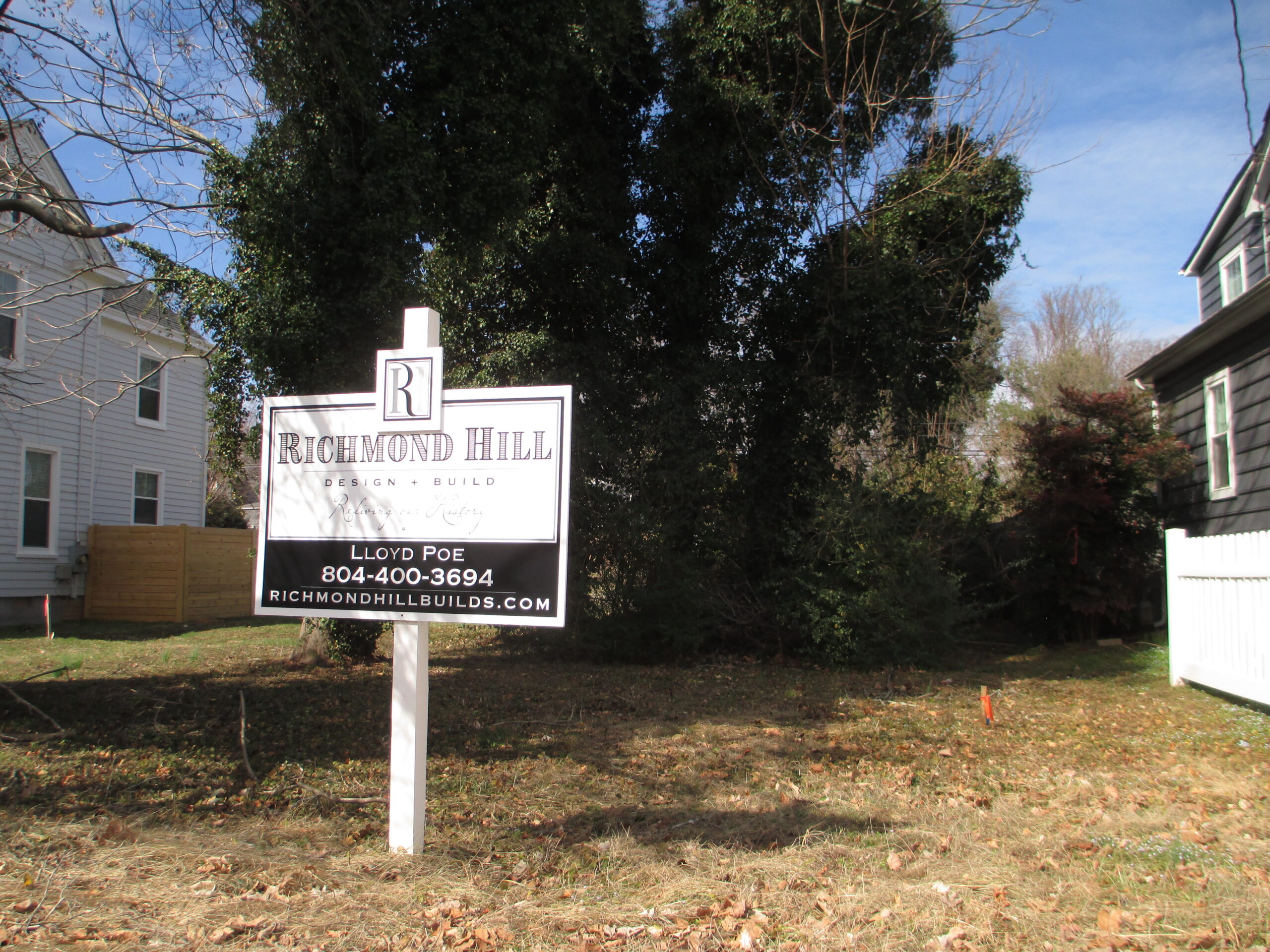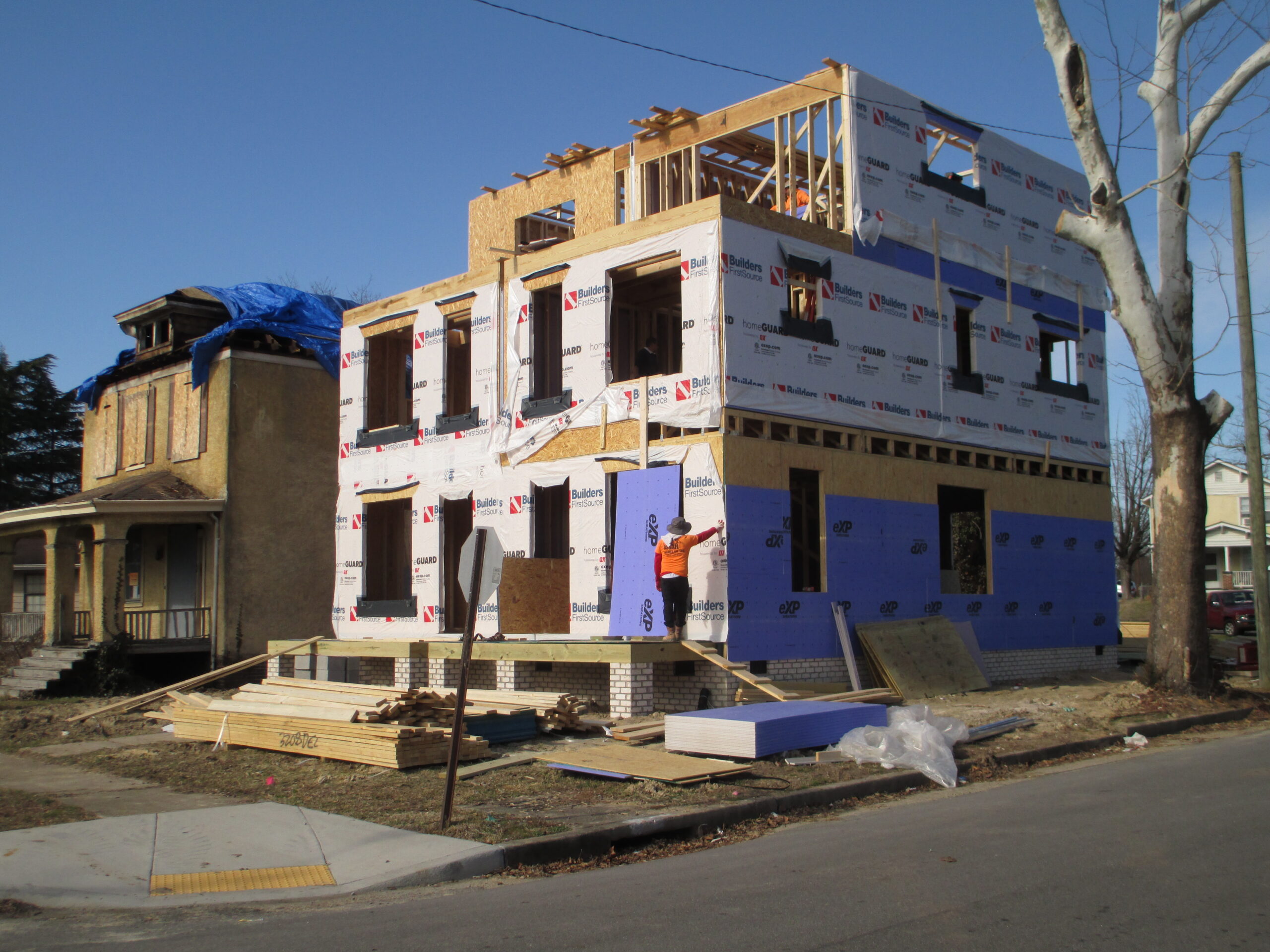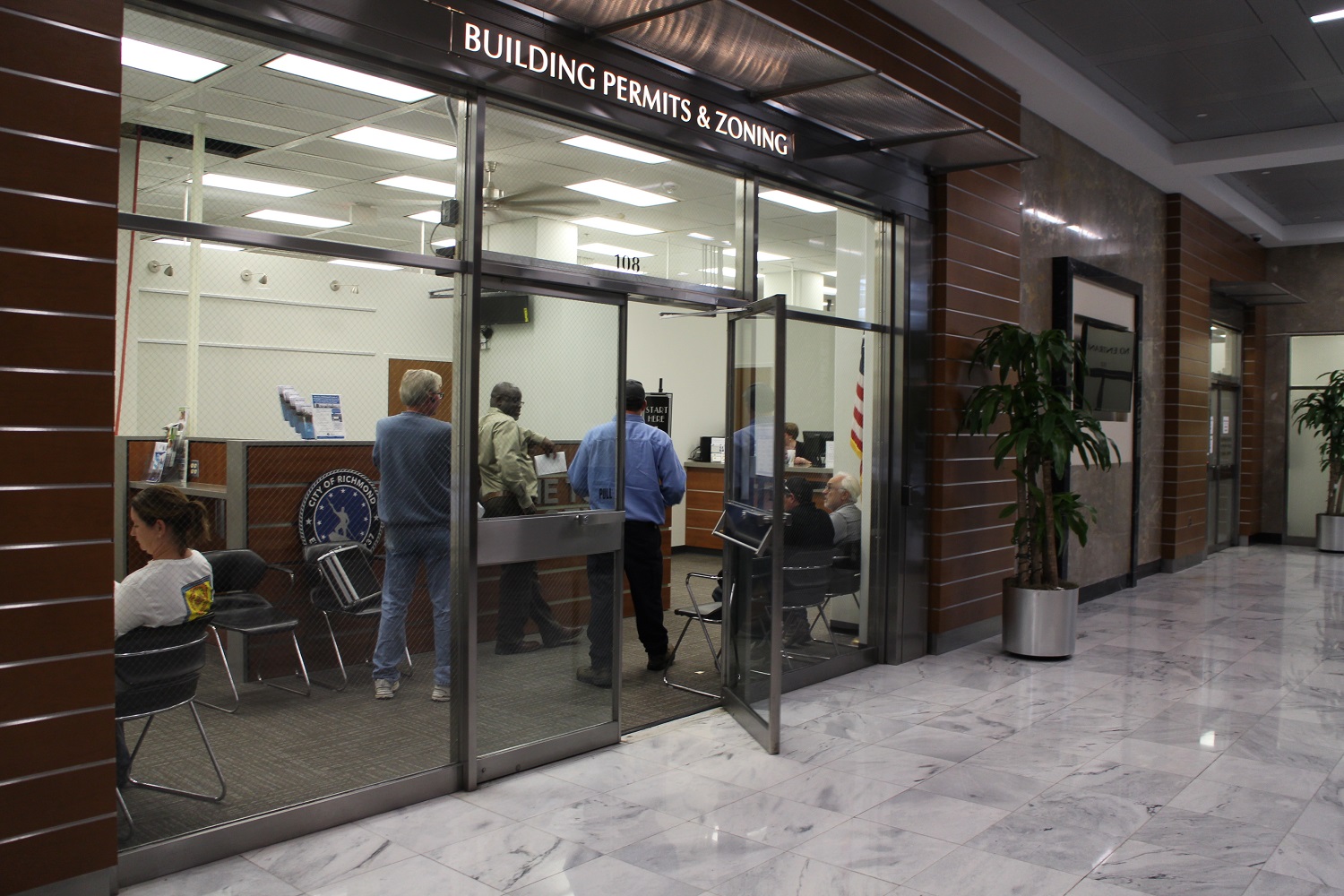Editor’s Note: This is the first installment in a three-part series examining development review processes at Richmond City Hall.
When Vanessa Poe applied for permits for a house she’s looking to build in Richmond’s Woodland Heights neighborhood, she was surprised to hear back not from City Hall staff, but from a consulting firm office in California.
The response she received two months after she’d applied included several pages’ worth of comments requesting certain details that Poe said the city had not required before – and some that, she said, had nothing to do with Virginia’s building code.
“I started reading, and they were applying California standards to this house, including things that we’ve never had before and don’t need,” said Poe, an architect who two years ago moved back to Richmond to join her father Lloyd Poe’s homebuilding firm, Richmond Hill Design + Build.
When she conveyed that to the California firm, a company called Bureau Veritas, Poe said she was told – another month later – that it was still learning the city’s requirements and that she now only needed to respond to one page worth of comments.
After more back-and-forth that she said cost her additional time and money, Poe was awarded a revised building permit earlier this month. It came six months after she submitted her application last August.
Poe said the experience has prompted her and her father to look for homebuilding opportunities outside the city. She said they’re venturing into the counties for the first time since Lloyd, a longtime local builder who founded CraftMaster Homes and LifeStyle Home Builders, started Richmond Hill four years ago.
If they do build in the city again, she said, they’ll be using its third-party review program, in which permit applicants can hire private inspectors or firms to conduct inspections and plan reviews. Approvals in that program reportedly take half the time it takes to go through City Hall directly, though with the additional cost of paying the firms.
“We’re now going to go through the third-party reviewers, because I do not want to go through this California company ever again,” Poe said.
“I’ve gotten estimates from other companies that it’s anywhere from $1,000 to $1,500 for them to review my architectural drawings, but it would save me probably three months of permit time with the City of Richmond. And time is money,” she said.
The city launched its third-party review program for applicants in early 2020, in an effort to provide a quicker option and reduce a lingering backlog in its plan reviews and inspections.
But as the program now enters its third year, that backlog remains — prompting the city to hire a third party of its own.
Outsourcing reviews
The city enlisted Bureau Veritas in November to help tackle its internal plan review backlog specifically. The company, which provides code administration services for governments across the country, is processing the plans it gets from Richmond out of one of its offices in Irvine, California.
In its first three months on the job for Richmond, as of early February, Bureau Veritas had been assigned 165 plan reviews, lightening a workload for the city that last year averaged 1,163 plan reviews per quarter, according to data provided by the city.
But the load-lightening has also come with a learning curve that Poe and others said gummed up the works, at least initially.

The Semmes Avenue site where Richmond Hill Design + Build is planning a 2,600-square-foot house. It took the firm six months to get a building permit. (Jonathan Spiers photo)
“I wish the city would’ve just had more communication that this was happening,” Poe said. “Even a heads up of, ‘Hey, we hired this company to help us out,’ so it wasn’t just out of the blue that I get this company out in California. I feel like I was bringing them up to speed on my time and dime, which affects my workload as well.”
Poe’s experience isn’t unique. In recent months, BizSense has heard from multiple builders and developers who reported similar interactions with Bureau Veritas — several of them speaking on condition of anonymity, citing concerns of repercussions in their dealings with City Hall.
One local builder, who did not want to be named, said he experienced a similar scenario when contacted by the company a few months ago.
“They had 23 comments on a set of plans, and 20 of them didn’t relate to our Virginia code. They really related to earthquake codes in California,” he said. “Once we explained that to them, the response basically was, ‘Oh, OK. Here’s your permit.’”
The builder, who has been active in the city for years, said the three months it can take him to get approvals from City Hall — without paying extra to use the third-party review program — is not acceptable.
“I can literally build a house and move a family in it in a shorter timeframe than it takes to get the permit from City Hall,” the builder said. “It’s always been bad; it’s just never been quite this bad, when you’re actually sending my plans out to somebody outside of Richmond to review them because Richmond can’t keep up with it.”
David Alley, Richmond’s building commissioner, said such issues are being worked out with Bureau Veritas and that a learning curve is to be expected when working with an outside vendor.
“This particular agency is based in California and is very qualified to perform building plan review for commercial and residential,” Alley said in an emailed response to BizSense. “Since they are based in California, some adjustments to the Virginia codes would be expected.”
‘Tried-and-true process’
Of the 165 reviews initially assigned to Bureau Veritas, Alley said, 40 had been approved by the start of this month, while 79 had been denied or were awaiting additional info. Twelve were actively under review, and 34 were waiting to be reviewed.
Alley, a 20-year city employee who started leading the permits and inspections office last fall, acknowledged that some of Bureau Veritas’s reviews have taken as long as three months, though he said the delays were not all due to the firm.
“These delays were associated with adjustments to the Virginia codes and technical issues. Some delays were contributed (by) the contractors not responding to the plan examiners’ comments in a timely manner,” he said.
Richmond is paying Bureau Veritas $75,000 for the service through an encumbrance, meaning funds already available in the city’s current fiscal year budget. Alley said the amount did not meet the threshold for requiring a solicitation for proposals from other firms.
Alley said the arrangement with Bureau Veritas was put in motion by his predecessor, Jason Carangelo, who parted ways with the city in September after a two-year stint.
Carangelo also led the implementation of the separate third-party review program for applicants, aimed at addressing the city’s surge in development activity and complaints of slow turnaround times that have plagued the bureau for years.
Alley said he did not know how the arrangement with Bureau Veritas came to be, or why the city’s plans are being processed on the West Coast rather than an office closer to Richmond. Similar questions submitted to Bureau Veritas were not answered in time for this story.
Theresa Anderson, a spokeswoman for Bureau Veritas, said the agency is committed to working with the city and stands by what she called its “tried-and-true process” for providing plan reviews.
“This process was used in Richmond and Bureau Veritas complied with the City’s requests, closely tracking against the City’s outlined requirements,” Anderson said in an email. “As you know, Bureau Veritas is a third-party consultant, and the City is the ultimate authority and enforcer of its codes.”
‘It was kind of a debacle’
Alley said outsourcing to Bureau Veritas is contributing to the goal of eliminating the city’s plan review backlog. Builders, however, say it’s contributed to the backlog itself.
“You are hiring this company to outsource your plan reviews, thinking it’s going to help you out. But these plan reviews are so strict and they’re requiring so much additional information it’s actually going to create more of a backlog,” said Kyle Hoffer, owner of Watchtower Homes and Construction.
Hoffer, who said he submits for as many as 30 permits a year from the city, was recalling what he said he told Alley when he was first contacted by Bureau Veritas in December.
He said the review he received back had seven pages of comments requiring such things as full electrical, mechanical and HVAC plans. He said those sorts of details are more typically required of a commercial structure, not single-family dwellings like the pair of attached homes he’s now building on Delaware Avenue in North Highland Park.
“I don’t know what the decision-making factors were for the city to spend money for another agency to do their internal plan reviews, but it was kind of a debacle,” Hoffer said. “It was not launched correctly. There were no boundaries put in place.”
Hoffer said he has since submitted for 10 house permits and all of them went to Bureau Veritas. Having learned how long the reviews could take, he said he resubmitted half of them through the applicant-based third-party review program to reduce the turnaround time, though he resents paying the cost to do so.

Construction is underway on the pair of attached homes that Kyle Hoffer’s Watchtower Homes and Construction is building on Delaware Avenue in North Highland Park. The homes are among those that have been reviewed by Bureau Veritas. (Jonathan Spiers photo)
“I got one permit doing that, but it still bothers me because I have to pay $1,500 to $1,700 to do this,” Hoffer said, adding that he wants to help the permitting office improve its operations.
“I want the city to become efficient in processing building permits,” he said. “It’s not fair to take this long and cost this much money to get a building permit.”
Kevin Vonck, who oversees the permitting office as director of Richmond’s Planning and Development Review department, said he and Alley are looking at using other outside vendors that could further reduce the review backlog, and in turn improve turnaround times for permits.
“Once we get the backlog of permits moving, we want to make sure we don’t create another during the plan review process,” Vonck said in an email.

Kevin Vonck oversees the permits and inspections office as director of Richmond’s Planning and Development Review department. (BizSense file)
Alley said he expects the third-party program will then work more effectively as an option for inspections, not just plan reviews. He said the program so far has been used more for reviews due to the backlog that has slowed those applications.
“I truly expected that the program would be used more for full inspections rather than plan review services for large projects,” Alley said. “I expect that once we have eliminated our backlog, the program will proceed as intended.”
Permit processing times ranged from 27 to 49 calendar days as of last month, according to the office’s website. Processing for certain permits and plan reviews were taking as long as two to three weeks.
By the start of this month, the office had processed 26,660 inspections this fiscal year so far, Alley said. It totaled 39,191 in fiscal year 2021, and 46,844 in FY20.
Staffing up
Alley said outsourcing is one of several approaches the city is taking to improve the office’s operations and turnaround times.
The city has put an emphasis on filling the office’s ranks, which at one point over the course of the pandemic dipped below half its budgeted staffing level, Alley said. A city hiring freeze during the pandemic prevented vacancies from being filled until recently.
Alley said they’ve filled over 30 “essential” positions, including 10 “permit specialist” positions that review all applications and correspondence with applicants.
“This area is one of two that needed a full staff in order to keep up with customer demand,” he said. With the intake office fully staffed, Alley added, “we will begin to eliminate the longtime backlog of applications. Our goal is to eliminate the backlog by May 1, if not sooner.”
On the plan review side, Alley said, the city had filled three positions as of February and was advertising for two more.
Other efforts have included implementation of an “early start authorization” program that allows, under certain conditions, for builders to start interior work on a project while the building plan is under review.
The office has also added a permit intake status feature on its website, as well as a customer service phone line and an expedited submittal program for certain types of permits.
Alley said more improvements are to come later this year. Among those on the table is new permitting software that’s included in the city’s proposed fiscal year budget. In presenting the budget earlier this month, Mayor Levar Stoney said the upgrade would help the office better communicate how the permitting process works, what’s required for a complete application, and track applications.
“We will continue to improve our services throughout this year, as we have many goals to achieve,” Alley said. “We are extremely dedicated to improving all our services that we provide to the community, and I believe that we now have the best staff in place to achieve success.”
Improvements seen
Heading into its third year, Alley said he’s satisfied with how the third-party review program is performing. The program allows applicants to hire three firms pre-approved by the city: ECS Mid-Atlantic, Institute for Building Technology & Safety, and Midlothian-based SC Stevenson Consulting.
“I’m very pleased with the program overall,” Alley said. “As with any new program, we will be revising, updating and making changes that will better serve our customers.”
While such updates can’t come soon enough for some builders, others say they are starting to see improvements.
Charlie Wilson, a consultant with Baker Development Resources who works with the bureau regularly representing clients, said he sees the bureau heading in a positive direction under the current leadership.
“I’m more positive about what’s going on in there than most people,” Wilson said, adding that the office has been responsive to feedback he and others have provided. He said the reviews he’s received from Bureau Veritas have gone from 25 to 30 comments initially to five or six comments now — “which is much more manageable,” he said.
“I think David Alley deserves a big shoutout for a lot of the adjustments being made, and by extension Dr. Vonck as well,” Wilson said. “There has been a noticeable difference in how this administration approaches permitting.”
Editor’s Note: This is the first installment in a three-part series examining development review processes at Richmond City Hall.
When Vanessa Poe applied for permits for a house she’s looking to build in Richmond’s Woodland Heights neighborhood, she was surprised to hear back not from City Hall staff, but from a consulting firm office in California.
The response she received two months after she’d applied included several pages’ worth of comments requesting certain details that Poe said the city had not required before – and some that, she said, had nothing to do with Virginia’s building code.
“I started reading, and they were applying California standards to this house, including things that we’ve never had before and don’t need,” said Poe, an architect who two years ago moved back to Richmond to join her father Lloyd Poe’s homebuilding firm, Richmond Hill Design + Build.
When she conveyed that to the California firm, a company called Bureau Veritas, Poe said she was told – another month later – that it was still learning the city’s requirements and that she now only needed to respond to one page worth of comments.
After more back-and-forth that she said cost her additional time and money, Poe was awarded a revised building permit earlier this month. It came six months after she submitted her application last August.
Poe said the experience has prompted her and her father to look for homebuilding opportunities outside the city. She said they’re venturing into the counties for the first time since Lloyd, a longtime local builder who founded CraftMaster Homes and LifeStyle Home Builders, started Richmond Hill four years ago.
If they do build in the city again, she said, they’ll be using its third-party review program, in which permit applicants can hire private inspectors or firms to conduct inspections and plan reviews. Approvals in that program reportedly take half the time it takes to go through City Hall directly, though with the additional cost of paying the firms.
“We’re now going to go through the third-party reviewers, because I do not want to go through this California company ever again,” Poe said.
“I’ve gotten estimates from other companies that it’s anywhere from $1,000 to $1,500 for them to review my architectural drawings, but it would save me probably three months of permit time with the City of Richmond. And time is money,” she said.
The city launched its third-party review program for applicants in early 2020, in an effort to provide a quicker option and reduce a lingering backlog in its plan reviews and inspections.
But as the program now enters its third year, that backlog remains — prompting the city to hire a third party of its own.
Outsourcing reviews
The city enlisted Bureau Veritas in November to help tackle its internal plan review backlog specifically. The company, which provides code administration services for governments across the country, is processing the plans it gets from Richmond out of one of its offices in Irvine, California.
In its first three months on the job for Richmond, as of early February, Bureau Veritas had been assigned 165 plan reviews, lightening a workload for the city that last year averaged 1,163 plan reviews per quarter, according to data provided by the city.
But the load-lightening has also come with a learning curve that Poe and others said gummed up the works, at least initially.

The Semmes Avenue site where Richmond Hill Design + Build is planning a 2,600-square-foot house. It took the firm six months to get a building permit. (Jonathan Spiers photo)
“I wish the city would’ve just had more communication that this was happening,” Poe said. “Even a heads up of, ‘Hey, we hired this company to help us out,’ so it wasn’t just out of the blue that I get this company out in California. I feel like I was bringing them up to speed on my time and dime, which affects my workload as well.”
Poe’s experience isn’t unique. In recent months, BizSense has heard from multiple builders and developers who reported similar interactions with Bureau Veritas — several of them speaking on condition of anonymity, citing concerns of repercussions in their dealings with City Hall.
One local builder, who did not want to be named, said he experienced a similar scenario when contacted by the company a few months ago.
“They had 23 comments on a set of plans, and 20 of them didn’t relate to our Virginia code. They really related to earthquake codes in California,” he said. “Once we explained that to them, the response basically was, ‘Oh, OK. Here’s your permit.’”
The builder, who has been active in the city for years, said the three months it can take him to get approvals from City Hall — without paying extra to use the third-party review program — is not acceptable.
“I can literally build a house and move a family in it in a shorter timeframe than it takes to get the permit from City Hall,” the builder said. “It’s always been bad; it’s just never been quite this bad, when you’re actually sending my plans out to somebody outside of Richmond to review them because Richmond can’t keep up with it.”
David Alley, Richmond’s building commissioner, said such issues are being worked out with Bureau Veritas and that a learning curve is to be expected when working with an outside vendor.
“This particular agency is based in California and is very qualified to perform building plan review for commercial and residential,” Alley said in an emailed response to BizSense. “Since they are based in California, some adjustments to the Virginia codes would be expected.”
‘Tried-and-true process’
Of the 165 reviews initially assigned to Bureau Veritas, Alley said, 40 had been approved by the start of this month, while 79 had been denied or were awaiting additional info. Twelve were actively under review, and 34 were waiting to be reviewed.
Alley, a 20-year city employee who started leading the permits and inspections office last fall, acknowledged that some of Bureau Veritas’s reviews have taken as long as three months, though he said the delays were not all due to the firm.
“These delays were associated with adjustments to the Virginia codes and technical issues. Some delays were contributed (by) the contractors not responding to the plan examiners’ comments in a timely manner,” he said.
Richmond is paying Bureau Veritas $75,000 for the service through an encumbrance, meaning funds already available in the city’s current fiscal year budget. Alley said the amount did not meet the threshold for requiring a solicitation for proposals from other firms.
Alley said the arrangement with Bureau Veritas was put in motion by his predecessor, Jason Carangelo, who parted ways with the city in September after a two-year stint.
Carangelo also led the implementation of the separate third-party review program for applicants, aimed at addressing the city’s surge in development activity and complaints of slow turnaround times that have plagued the bureau for years.
Alley said he did not know how the arrangement with Bureau Veritas came to be, or why the city’s plans are being processed on the West Coast rather than an office closer to Richmond. Similar questions submitted to Bureau Veritas were not answered in time for this story.
Theresa Anderson, a spokeswoman for Bureau Veritas, said the agency is committed to working with the city and stands by what she called its “tried-and-true process” for providing plan reviews.
“This process was used in Richmond and Bureau Veritas complied with the City’s requests, closely tracking against the City’s outlined requirements,” Anderson said in an email. “As you know, Bureau Veritas is a third-party consultant, and the City is the ultimate authority and enforcer of its codes.”
‘It was kind of a debacle’
Alley said outsourcing to Bureau Veritas is contributing to the goal of eliminating the city’s plan review backlog. Builders, however, say it’s contributed to the backlog itself.
“You are hiring this company to outsource your plan reviews, thinking it’s going to help you out. But these plan reviews are so strict and they’re requiring so much additional information it’s actually going to create more of a backlog,” said Kyle Hoffer, owner of Watchtower Homes and Construction.
Hoffer, who said he submits for as many as 30 permits a year from the city, was recalling what he said he told Alley when he was first contacted by Bureau Veritas in December.
He said the review he received back had seven pages of comments requiring such things as full electrical, mechanical and HVAC plans. He said those sorts of details are more typically required of a commercial structure, not single-family dwellings like the pair of attached homes he’s now building on Delaware Avenue in North Highland Park.
“I don’t know what the decision-making factors were for the city to spend money for another agency to do their internal plan reviews, but it was kind of a debacle,” Hoffer said. “It was not launched correctly. There were no boundaries put in place.”
Hoffer said he has since submitted for 10 house permits and all of them went to Bureau Veritas. Having learned how long the reviews could take, he said he resubmitted half of them through the applicant-based third-party review program to reduce the turnaround time, though he resents paying the cost to do so.

Construction is underway on the pair of attached homes that Kyle Hoffer’s Watchtower Homes and Construction is building on Delaware Avenue in North Highland Park. The homes are among those that have been reviewed by Bureau Veritas. (Jonathan Spiers photo)
“I got one permit doing that, but it still bothers me because I have to pay $1,500 to $1,700 to do this,” Hoffer said, adding that he wants to help the permitting office improve its operations.
“I want the city to become efficient in processing building permits,” he said. “It’s not fair to take this long and cost this much money to get a building permit.”
Kevin Vonck, who oversees the permitting office as director of Richmond’s Planning and Development Review department, said he and Alley are looking at using other outside vendors that could further reduce the review backlog, and in turn improve turnaround times for permits.
“Once we get the backlog of permits moving, we want to make sure we don’t create another during the plan review process,” Vonck said in an email.

Kevin Vonck oversees the permits and inspections office as director of Richmond’s Planning and Development Review department. (BizSense file)
Alley said he expects the third-party program will then work more effectively as an option for inspections, not just plan reviews. He said the program so far has been used more for reviews due to the backlog that has slowed those applications.
“I truly expected that the program would be used more for full inspections rather than plan review services for large projects,” Alley said. “I expect that once we have eliminated our backlog, the program will proceed as intended.”
Permit processing times ranged from 27 to 49 calendar days as of last month, according to the office’s website. Processing for certain permits and plan reviews were taking as long as two to three weeks.
By the start of this month, the office had processed 26,660 inspections this fiscal year so far, Alley said. It totaled 39,191 in fiscal year 2021, and 46,844 in FY20.
Staffing up
Alley said outsourcing is one of several approaches the city is taking to improve the office’s operations and turnaround times.
The city has put an emphasis on filling the office’s ranks, which at one point over the course of the pandemic dipped below half its budgeted staffing level, Alley said. A city hiring freeze during the pandemic prevented vacancies from being filled until recently.
Alley said they’ve filled over 30 “essential” positions, including 10 “permit specialist” positions that review all applications and correspondence with applicants.
“This area is one of two that needed a full staff in order to keep up with customer demand,” he said. With the intake office fully staffed, Alley added, “we will begin to eliminate the longtime backlog of applications. Our goal is to eliminate the backlog by May 1, if not sooner.”
On the plan review side, Alley said, the city had filled three positions as of February and was advertising for two more.
Other efforts have included implementation of an “early start authorization” program that allows, under certain conditions, for builders to start interior work on a project while the building plan is under review.
The office has also added a permit intake status feature on its website, as well as a customer service phone line and an expedited submittal program for certain types of permits.
Alley said more improvements are to come later this year. Among those on the table is new permitting software that’s included in the city’s proposed fiscal year budget. In presenting the budget earlier this month, Mayor Levar Stoney said the upgrade would help the office better communicate how the permitting process works, what’s required for a complete application, and track applications.
“We will continue to improve our services throughout this year, as we have many goals to achieve,” Alley said. “We are extremely dedicated to improving all our services that we provide to the community, and I believe that we now have the best staff in place to achieve success.”
Improvements seen
Heading into its third year, Alley said he’s satisfied with how the third-party review program is performing. The program allows applicants to hire three firms pre-approved by the city: ECS Mid-Atlantic, Institute for Building Technology & Safety, and Midlothian-based SC Stevenson Consulting.
“I’m very pleased with the program overall,” Alley said. “As with any new program, we will be revising, updating and making changes that will better serve our customers.”
While such updates can’t come soon enough for some builders, others say they are starting to see improvements.
Charlie Wilson, a consultant with Baker Development Resources who works with the bureau regularly representing clients, said he sees the bureau heading in a positive direction under the current leadership.
“I’m more positive about what’s going on in there than most people,” Wilson said, adding that the office has been responsive to feedback he and others have provided. He said the reviews he’s received from Bureau Veritas have gone from 25 to 30 comments initially to five or six comments now — “which is much more manageable,” he said.
“I think David Alley deserves a big shoutout for a lot of the adjustments being made, and by extension Dr. Vonck as well,” Wilson said. “There has been a noticeable difference in how this administration approaches permitting.”








Geez, what a goat rope. The city is, and continues to be, an embarrassment from the top down. None of these problems are new yet here we are with yet another mockery of a plan to fix decade old problems.
As of two years ago, the City was collecting $9.5 Million annually in fees from builders and spending less than half of that on staff to service those fees. And this is despite a state law that says that municipalities cannot use permitting fees as a revenue source. Well over a billion dollars of future increased assessed value of real estate is still tied up in delays. At current tax rates, that’s about $15-18 Million per year that the City could put to work in building schools, or providing housing for the poor and indigent or lowering the tax rates… Read more »
We recently moved from the west coast and I was always a little confused how a luxury home could be built around here for $175-250 per square feet while it was over $1,000 in parts of California. I know land prices factor significantly, but 20/23 comments on a set of plans did not apply to the Virginia code. There are probably some of the comments that could used as best-practices to build better than code, but this permitting cost very clearly is impacting how fast builders can build, is driving up constructions costs, ultimately limiting supply. “Of the 165 reviews… Read more »
I know I can’t get over the “some adjustments” and then goes on to state he “doesn’t know how” this outside party came to be a reviewer. Wait aren’t you the building official. Were you not brief on policies and outside vendors??
Nothing is shocking regarding the ineptitude of the city. But this makes perfect sense, it aligns well with the over-priced taxes, poor schools, and marked uptick in all crime (particularly the 2021 homicide ranking high in the country per 100,000 residents). Here is an idea – why don’t you take all the applications and ask VCU to help out. They have LITERALLY thousands of people between the real estate majors and engineering schools that could knock the backlog out in about four weeks; three weeks training, one week to do the work.
It might be helpful to bring in VCU students as summer interns but tossing these professional problems on their School of Real Estate is not an alternative. Nor was the idea of hiring a California firm to process Virginia applications.
Once again the City of Richmond gets an “F” for functioning effectively. Why not hire a Virginia firm that’s familiar with State Codes rather than a California company that has to have a “learning curve.”
Better yet why not hire a local architectural/engineering company to provide for plan reviews and permits.
Someone needs to use the Freedom of Information Act to find out how much this is costing the taxpayers in Richmond. I can’t imagine that a California company is a bargain!
I agree with sentiment but there is probably a concern about conflict of interest that might restrict using a Virginia firm. Frankly, every local engineering firm is searching for qualified applicants to fill its own work orders, so that’s another issue. Developers no longer bid work to engineers and general contractors; developers are interviewed by the consultants and GCs. If you are a young person (not you or me, Brian!) graduating with a degree in engineering or construction, your near future is secure. If you are skilled tradesman (or woman) your skills are needed in this region.
Mayor Stoney stated in his mayoral debate that fixing the permit office was a number one priority for him in his second term. While challenging this is not a complex systemic issue. Our neighbors Chesterfield County and Henrico County have this process down to a science. I think it should be all of our expectations that the mayors office solve this problem in the next few years. All they need to do is take some cues from Chesterfield and copy what they do. If a mayor can’t solve an administrative problem this fixable then that mayor is not an effective… Read more »
There’s a new group of City leadership scheduled to sit with the HBAR MF Council roundtable in mid April to outline their program to improve their processes and set timetables. We’ve heard it all before, but we’re optimistic that this will be the turning point. Major changes are needed; perhaps major changes are coming.
Honestly, outsourcing is the way forward, currently city permit office is terminal.
They just need to work the bugs out, maybe move to a more responsive provider.
They also need to fix the front end process. The whole one drive bit is a nightmare
At this point I am beyond surprised the building and trades firms have not collectively SUED the City of Richmond asking a judge for a declaratory judgment and courted order oversight of the permitting office.
Great article Jonathan and with significant depth to frame in this increasingly frustrating problem. My most recent building permit required 8 months and that was using a third-party consultant to help facilitate the process. While I’m thrilled to learn of this recent outsourcing of plan reviews, why is a California firm providing this service? Are there no qualities firms in RVA who already know local building codes that can fill this role? The fact that this firm has applied California (not Virginia) standards as part of their review should call into question their competence on the most fundamental level. Please… Read more »
Great article Jonathan, and very much needed. I hope the subsequent parts to this article compares and contrasts the effectiveness of the City of Richmond to our surrounding counties. A previous article quoted one of our council members stating that city is not in competition with the surrounding counties after voting down Navy Hill and much of the development shifted towards the Green City in Henrico. The city should absolutely compete with the surrounding counties. Why not compete to offer better schools, ease of commerce, more affordable housing, lower crime rates, and better infrastructure for it’s residents? It all goes… Read more »
Actually the Navy Hill decision has turned out very well for the City. New office and medical buildings are slowly working their way through City Hall and several acres of useless buildings will be cleared very shortly for new additions to the City skyscape without impacting the 80+ surrounding blocks with additional taxes. The City will get what it needs; Henrico will get what it wants.
I would agree with all your points and I’m not debating the merits of Navy Hill. My point was more focused on the mindset of Richmond’s City Council of leading the way for the Metro area Vs. being dragged up by the surrounding counties.
Are any regular readers of BizS surprised at this article? How many more instances of ineptitude by the City is required? It’s never going to change. Stoney gets re-elected and then tells you (the voters) that you were wrong about the casino. How do you think he can fix a permit office? I lived in the city when the snow Plows drove around town with the blades up. The news uncovered they weren’t paid to plow snow unless it was a certain street. So we paid folks to drive around and not plow until they crossed town to get to… Read more »
This is the same article biz sense wrote 2-3 years ago. The people quoted in that article were all full of optimism, the article outlined all kinds of plans and strategies to fix the problems, none of which happened. The truth is despite all the ink and words spilled trying to explain and justify the cities results, the results remain wholly unacceptable. Furthermore it is not some unsolvable problem, there are two huge counties surrounding the city that both have processed in place that are airtight and produce permits in a tenth of the time for a fraction of the… Read more »
You are spot on – the City can change processes and introduce all the new and innovative programs they want – but a lack of true leadership and business acumen will lead to failure every time.
I have a simple question that might have a very complex answer but here goes: Why not outsource the permit process north of the river to Henrico and south of the river to Chesterfield? They both have the permit and inspection processes in place, and the city staff could be divided between the two offices. The city fees would go to the respective office issuing the permits. Perhaps in several years the staff would be able to return to a “City run” operation, but until then the problems could be addressed. It is time for everyone to think outside the… Read more »
Steve – interesting idea. What about paying Chesterfield and Henrico staff to review these plans outside their normal workday? It would bring extra cash to fully qualified plan review professionals while reducing the backlog.
@Steve and @Alan…Steve’s plan assumes workers will return to the city. They won’t unless the system of management changes. Alan’s assumes existi\ng full time workers can or will work extra hours. That brings an entirely nw set of issues, like benefits, burn-out, scheduling, etc.
Neither solution fixes the problem for years.
Invest in the right people (salary) and training (processes) now. Some of the areas of plan review are very efficient. Some are not.
Alan & Matt: Thanks for your replies. Note I said “perhaps” about the movement back to the City running the show internally. I’m skeptical that A) City management would ever agree to the move to the counties providing the services, and B) if they did, that there would be the capability of ever bringing it back to the City to efficiently run on its own behalf. Outsourcing to localities would be the best course of action. I do not think the parttime approach would bear fruit as you need strong management oversight, training and additional resources to solve this problem.… Read more »
Spot on!! Has anyone in Henrico ever tried to get a gas line run to their house for a kitchen renovation, new gas appliances or gas logs? Guess what – you gave to deal with the CITY to have it dug and placed. What a pain in the neck! Total run around for months!! All the other permits needed were from the county. Very smooth process. Ask me how I know…